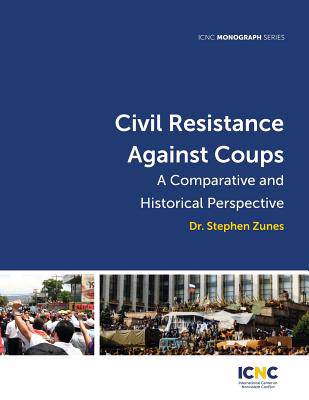
- Retrait gratuit dans votre magasin Club
- 7.000.000 titres dans notre catalogue
- Payer en toute sécurité
- Toujours un magasin près de chez vous
- Retrait gratuit dans votre magasin Club
- 7.000.0000 titres dans notre catalogue
- Payer en toute sécurité
- Toujours un magasin près de chez vous
Civil Resistance Against Coups
A Comparative and Historical Perspective
Stephen ZunesDescription
Nations are not helpless
if the military decides to stage a coup. On dozens of occasions in recent
decades, even in the face of intimidated political leaders and international
indifference, civil society has risen up to challenge putschists through
large-scale nonviolent direct action and noncooperation. How can an
unarmed citizenry mobilize so quickly and defeat a powerful military
committed to seizing control of the government? What accounts for the
success or failure of nonviolent resistance movements to reverse coups and
consolidate democratic governance?
This monograph presents in-depth case studies and analysis intended to
improve our understanding of the strategic utility of civil resistance against
military takeovers; the nature of civil resistance mobilization against coups; the
role of civil resistance against coups in countries' subsequent democratization
efforts (or failure thereof). It offers key lessons for pro-democracy activists
and societies vulnerable to military usurpation of power; national civilian and
military bureaucracies; external state and non-state agencies supportive of
democracy; and future scholarship on this subject.
Spécifications
Parties prenantes
- Auteur(s) :
- Editeur:
Contenu
- Nombre de pages :
- 102
- Langue:
- Anglais
Caractéristiques
- EAN:
- 9781943271115
- Date de parution :
- 08-01-18
- Format:
- Livre broché
- Format numérique:
- Trade paperback (VS)
- Dimensions :
- 216 mm x 279 mm
- Poids :
- 335 g

Les avis
Nous publions uniquement les avis qui respectent les conditions requises. Consultez nos conditions pour les avis.






